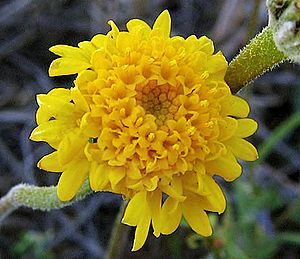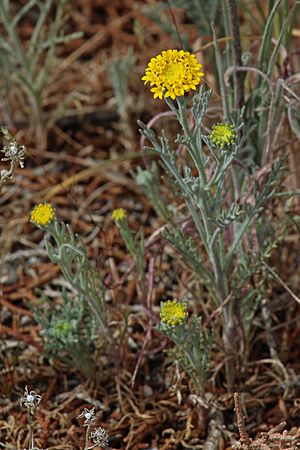Chaenactis glabriuscula facts for kids
Quick facts for kids Chaenactis glabriuscula |
|
|---|---|
 |
|
| Scientific classification | |
| Kingdom: | |
| (unranked): | |
| (unranked): | |
| (unranked): | |
| Order: | |
| Family: | |
| Tribe: | |
| Genus: | |
| Species: |
C. glabriuscula
|
| Binomial name | |
| Chaenactis glabriuscula |
|
| Synonyms | |
|
Synonymy
Chaenactis filifolia Harv.
Chaenactis tenuifolia Nutt. Chaenactis gracilenta Greene, syn of var. heterocarpha Chaenactis heterocarpha Torr. & A.Gray ex A.Gray, syn of var. heterocarpha Chaenactis tanacetifolia A.Gray, syn of var. heterocarpha Chaenactis tanacetaefolia A.Gray, syn of var. heterocarpha Chaenactis lanosa DC., syn of var. lanosa Chaenactis orcuttiana (Greene) Parish, syn of var. orcuttiana |
|

The Chaenactis glabriuscula, also known as the Yellow Pincushion, is a bright and cheerful flowering plant. It belongs to the daisy family, just like sunflowers and dandelions! This plant is native to sunny California and Baja California. It gets its common name, "Yellow Pincushion," from its many small, yellow flowers that look a bit like a pincushion.
Contents
Where Does the Yellow Pincushion Grow?
The Yellow Pincushion plant is very adaptable. It grows in many different places. You can find it in the Sierra Nevada mountains. It also lives in hot places like the Mojave and Colorado Deserts.
This plant likes areas with chaparral and woodlands. It also grows in coastal areas and mountain chaparral. It is usually found below 7,000 feet (about 2,130 meters) in elevation.
What Does the Yellow Pincushion Look Like?
The Yellow Pincushion is an annual herb. This means it grows, flowers, and dies within one year. It usually has one or more stems that stand upright. These stems can grow up to 50 centimeters (about 20 inches) tall.
The stems have branches and are often hairy. They might even look a bit like they have spiderwebs on them! The leaves can be up to 10 centimeters (4 inches) long. They are sometimes thick and fleshy. The leaves are usually divided into many tiny, curly parts.
Its Bright Yellow Flowers
The plant produces one to twenty or more flower heads. Each flower head grows on a long, straight stalk called a peduncle. The flower head is covered with flat, hairy or woolly leaves called phyllaries. These phyllaries are about 4.5 to 10 millimeters long.
Each flower head has many small, tube-shaped flowers. These flowers are bright yellow or golden in color. The flowers on the outside of the head are larger and flatter. Most of the flowers have anthers that stick out. After the flowers bloom, the plant produces a fruit called an achene. This achene can be over a centimeter long. It has a layered top called a pappus, which looks like scales.
Different Kinds of Yellow Pincushion
There are several different types, or varieties, of the Yellow Pincushion. These varieties are slightly different from each other. They often grow in different parts of California and Baja California.
Here are some of the main varieties:
- Chaenactis glabriuscula var. glabriuscula - Found from Tehama County to Baja California.
- Chaenactis glabriuscula var. heterocarpha - Grows from Shasta County to Ventura County. It is also found in Modoc and San Bernardino Counties.
- Chaenactis glabriuscula var. lanosa - Lives from Fresno County to San Diego County.
- Chaenactis glabriuscula var. megacephala - Found from Shasta County to Orange County.
- Chaenactis glabriuscula var. orcuttiana - This variety grows along the coast. It is found from Ventura County to Baja California.
Orcutt's Yellow Pincushion: A Rare Variety
One special variety is Chaenactis glabriuscula var. orcuttiana. It is also called Orcutt's yellow pincushion. This variety is quite rare. It only grows on beaches and coastal sand dunes in Southern California and Baja California.
This rare plant is in danger because of new buildings and homes being built along the coast. In 2010, new groups of Orcutt's yellow pincushion were found. Some were near Venice, Los Angeles, and others in Manhattan Beach. The California Native Plant Society says this variety is only found in California's dune ecosystems. Its numbers are going down. Confirmed groups of this plant are found in parts of Ventura, Los Angeles, and San Diego counties.
See also
 In Spanish: Chaenactis glabriuscula para niños
In Spanish: Chaenactis glabriuscula para niños
 | William M. Jackson |
 | Juan E. Gilbert |
 | Neil deGrasse Tyson |

